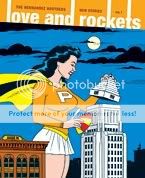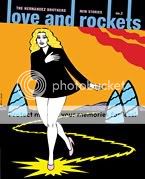Love and Rockets: New Stories #1-2
featuring “Ti-Girls Adventures Number 34”
Jaime Hernandez, writer/artist
Fantagraphics, 2008-2009
104 pages each
$14.99 each
This is going to sound a little weird, but one of my favorite things about the superhero flight of fancy with which Jaime inaugurated this third Love and Rockets series, now in bookstore-friendly post-altcomic squarebound format, is the fact that I was pronouncing the titular super-team’s name wrong nearly the whole time. I was thinking “Tee-Girls”–maybe you can blame the aging super-version of Xochtil’s resemblance to Maggie’s Tia Vicki for putting that pronunciation in my head–when as it turns out its a play on “Tigers.” And whaddayaknow, just like that, Jaime’s imaginary team of misfit superheroines fits right into the very real and very long legacy of superhero characters and creators I’ve heard people completely mispronounce: Namor the Sub-Mariner, Magneto, Sienkiewicz, Quesada, Byrne–not to mention “Jamie” Hernandez himself. Probably just a fluke, I know, but somehow it feels more like attention to detail.
It’s easy to dismiss “Ti-Girls Adventures Number 34” as precisely that sort of pleasant superhero-nostalgia diversion, a chance for Jaime to work directly in the idiom of one of his greatest but least frequently expressed influences. It’s certainly difficult to square it with the Locas-verse as we know it. The wildest left-turn back into the fantastic that the “Locas” strips have taken in probably 20 years, it transforms Penny Century into the mad superhero she’s always dreamed of becoming, reveals that Maggie’s apartment-complex neighbors Alarma and Angel are secretly superheroes themselves (we’d already caught some glimpses of Alarma in costume, but that was in the storyline where we also saw the devil take the form of a levitating black dog, so, y’know, grain of salt), brings sundry superheroes mentioned in the imaginary comics Maggie reads to life (e.g. Cheetah Torpeda, herself the namesake of a strip club Ray D. frequents), features inexplicably aged versions of previously existing characters like Maggie’s wrestler cousing Xochtil, posits the existence of a mutant-like female-only “gift” of superpowers, and ultimately reveals that Penny was never really real to begin with. “I’ve known Penny for quite a few years now,” Maggie says, “and in all that time she never aged. Like, she was not regular flesh and blood, but like, this drawing that was clipped from a comic book and pasted down here on Earth.” And here I’d thought she’d just used H.R. Costigan’s billions to have a lot of work done!
And indeed, Jaime’s art here is so zesty that maybe a chance to have fun with super-powered women in skimpy costumes really is the main point. (And frankly it’d be worth it if only for the debut of Alarma’s glam-rock cut-off-tank-top villain look. Yowza.) The effect he achieves with his black-and-white-uniformed Amazons flying around or smacking each other around against the night sky or in the void of outer space is frequently breathtaking–my dream comic con panel is a “spot-black-off” between him and Mike Mignola. Meanwhile his action choreography is to die for. Witness the knockout wordless nine-panel-grid page in Part Two of the story, featuring a series of images in which Angel attempts to join the fight against an off-the-right-hand-side-of-each-panel Penny Century, only to be rebuffed at each stage by one of the uber-powerful popular girls of the superhero scene, the Fenomenons. In each panel there’s a palpable drive from the left to the right, thanks to motion lines and those blacks, but there’s always something stopping Angel from getting to that elusive border. I know I lecture superhero writers and artists all the time about how they should be doing their job, but, well, this is how they should be doing their job.
But there is more to “Ti-Girls” than meets the eye. Super-Penny turns heel not just because she’s gone mad with power, but because those powers have caused her to lose two of her children; in order to thwart Penny, one of the Ti-Girls uses a ray-gun to zap another with a sample of Penny’s “maternal instinct,” which can be used as a homing device. I think this may be one of the most explicit explorations of motherhood ever for “Locas”; certainly Penny and Hopey’s dueling pregnancies way back when weren’t explored in terms of how the pair felt about the kids they had and/or didn’t have. There’s Tia Vicki’s misery over her belief that Maggie resents her for how she raised her, too, but that didn’t involve birth and babies and very young children like this storyline does. I wonder what it says about Maggie that this is all being processed in something very like a dream?
There’s also an explicit feminist angle. Women are the only people capable of becoming super-powered naturally; they’re born with “the gift,” while men have to try to recreate it with lab accidents or magic meteors or what have you. Meanwhile, the entire history of female superheroes in this world is one of their management and exploitation by one Dr. Zolar–his crowning superheroine-team creation is an all-teen unit, the Runaways to his Kim Fowley. But perhaps most strikingly, certainly if you read regular superhero comics, is what a non-presence male superheroes are. None are drafted into the fight against Penny, and the few we meet are basically non-entities who exist to get thrashed by one of Penny’s super-kids or to help out the Ti-Girls in locating them. The problems in the story–Penny’s rampage, a breakout at a female supervillain penitentiary, a supervillainness out for vengeance, a Bizarro Ti-Girl–are all caused by women, addressed by women, solved by women, and have consequences felt by women. I actually think you might have a hard time getting this comic to pass a reverse Bechdel Rule, in fact. And that’s enormously, enormously refreshing. If “Locas” has taught us anything, isn’t it that women should be the stars and driving forces behind their own damn comic, even if they’re dressing up in one-piece swimsuits and punching each other in the process?
Tags: comics, comics reviews, Comics Time, Jaime Hernandez, Los Bros Hernandez, Love and Rockets, LOVE AND ROCKTOBER, reviews



Great points, especially about Motherhood!
One of the first things I thought when I put down vol 3 (BROWNTOWN/LOVE BUNGLERS) was THANK GODDESS that Maggie HAD Tia Vicki, and suddenly seeing things from HER point of view!
Another aspect of that is Alarma’s relationship with HER Mother!
thanks for these, you are a strong writer & these are very much appreciated.